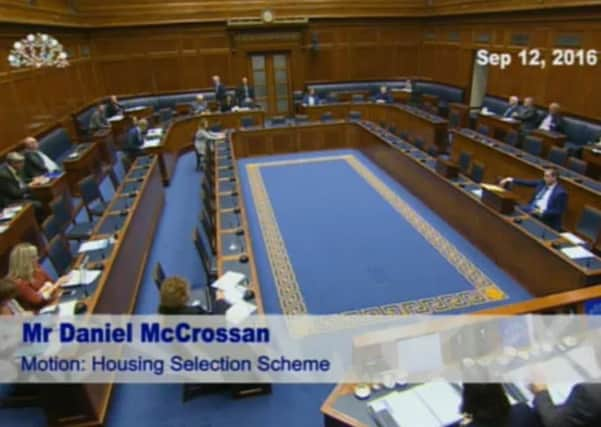MLAs return after long break - but Speaker blocks Nama scandal debate


MLAs sat in the Assembly chamber for the first time since 28 June after a summer which has seen an overwhelmingly peaceful marching season but dramatic developments relating to both Brexit and emerging revelations about the Province’s biggest ever property deal.
Last week the BBC’s Spotlight programme revealed audio recordings of Stormont’s Nama board member Frank Cushnahan accepting a bag stuffed with £40,000 of bank notes from a property developer.
Advertisement
Hide AdAdvertisement
Hide AdAnd almost a month ago senior Sinn Fein MLA Daithi McKay resigned as an MLA after admitting a role in helping to coach loyalist blogger Jamie Bryson ahead of a committee hearing – which Mr McKay was chairing – about the sale of the Nama portfolio.
Today’s Order Paper was rather scant, with – apart from questions to the economy and education ministers – only two substantive items of business in the form of private members’ motions, one of which was on stalking and the other on the Housing Selection Scheme.
But despite the request of several Opposition MLAs for Nama to be debated as an urgent matter, DUP Speaker Robin Newton refused to allow the issue to be discussed in the chamber during the five-hour sitting.
TUV leader Jim Allister made his unhappiness clear in the chamber, telling the Speaker: “Am I to understand that despite the most astounding revelations last week on BBC Spotlight this Assembly today is going to bury its head in the sand and proceed as if none of those revelations were made?
Advertisement
Hide AdAdvertisement
Hide Ad“Is that really so - we aren’t even going to have the opportunity by questions on matters of the day or anything else to debate those shocking issues?”
Mr Newton insisted Nama was not the type of issue that would usually be the focus of a matter of the day debate.
“The member will know there are considerations I take into account when matters of the day are raised,” he said.
Ulster Unionist leader Mike Nesbitt – who also attempted to have the issue debated – also criticised the Speaker’s decision.
Advertisement
Hide AdAdvertisement
Hide AdMr Nesbitt said: “This head in the sand ostrich approach does nothing to protect the integrity or relevance of the institutions under the control of DUP/Sinn Fein.”
Responding to the criticism, a spokeswoman for the Assembly said: “In line with parliamentary practise, here and elsewhere, the Speaker does not give reasons for his procedural decisions.
“He did make clear in the chamber that he took his decisions today in line with the procedures, rulings and precedents of the Assembly in relation to the specific purposes of Matters of the Day as a series of short statements and not an official debate.
“The Speaker also has specific responsibilities under Assembly Standing Orders to ensure that the business of the House is conducted in line with a range of legal considerations and he will take care to exercise those duties appropriately.
Advertisement
Hide AdAdvertisement
Hide Ad“In his remarks and letter to Members today about his review of committee procedures, the Speaker acknowledged that Members often find parliamentary procedures frustrating. Yet the Speaker does expect Members themselves to consider the appropriate procedural route to pursue an issue.
“The Speaker has been engaging with officials to issue updated guidance in the coming weeks as he recognises that there is a need to assist in increasing the awareness that new and returning Members have of Assembly procedures.
“The Business Committee, containing representatives of the five biggest parties, selects the substantive business in front of the Assembly. Within that, the Speaker would always encourage Members to use the opportunities available to them to raise and scrutinise issues as Members who were in the chamber today for Ministerial statements and questions have done on a variety of issues including the implications of Brexit.”